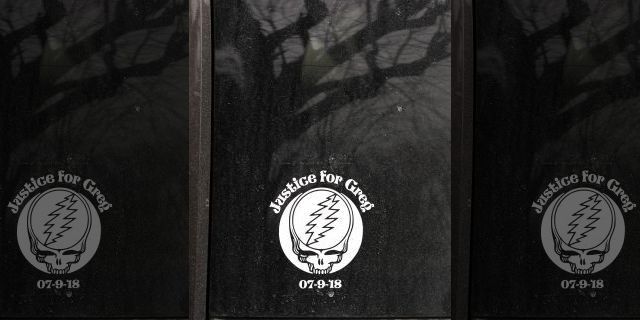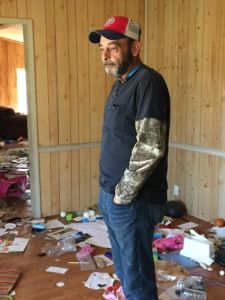This is utter BS.
Party Guests Suing Over Mass Arrest for Less Than An Ounce of Marijuana
Attorneys representing the arrestees in Cartersville, Georgia, say they were mistreated in jail, lost jobs, and endured public humiliation.
On Dec. 31, 2017, Nija Guider finished her waitressing shift and headed to a friend’s 21st birthday party in Cartersville, Georgia. She had been at the party for less than an hour when, suddenly, the police arrived. Without a warrant or permission, they entered the house and detained everyone inside. Guider and more than 60 other guests’ wrists were zip-tied.
“Boom, we were all going to jail,” Guider, then 21, recalled.
Each guest was charged with possessing less than an ounce of marijuana that had been found in the home. Some spent days in jail, held under harsh conditions, Guider and other party guests allege. The district attorney’s office would eventually drop charges against everyone. But many of those swept up at the party say the arrest cost them jobs and hurt their reputations.
While Guider was still in jail, her mugshot and those of others arrested were posted on the Bartow County jail website, in violation of Georgia state law, according to their attorneys. By the afternoon of Dec. 31, their mugshots were on the news, underneath headlines about a Cartersville drug bust.
“Everybody was treated inhumanely and talked to like they should expect this,” said Atteeyah Hollie, senior staff attorney at Southern Center for Human Rights.
Now Hollie and her colleagues, along with attorneys from The Merchant Law Firm PC, are helping the arrestees fight back. Today, they
filed suit against the city of Cartersville, as well as members of the Cartersville Police Department, Bartow-Cartersville Drug Task Force, and Bartow County sheriff’s office, alleging that the search and mass arrest violated the plaintiffs’ constitutional rights.
Cartersville Mayor Matt Santini told The Appeal in an email that because the incident may involve litigation, he could not comment. The Cartersville chief of police and Bartow-Cartersville Drug Task Force did not respond to requests for comment. In response to a public records request, Bartow County Sheriff Clark Millsap shared general information regarding the department’s procedures but did not address the specific allegations.
Everybody was treated inhumanely and talked to like they should expect this.Atteeyah Hollie, Southern Center for Human Rights
Sun Choy, who is representing the city, said over email that he could not give an interview “in light of the anticipated litigation.” However, he added, “I am comfortable in saying that we believe that any plaintiff will have to overcome some significant legal hurdles if he/she pursues a claim.”
In addition to recovering financial damages for their clients, the plaintiffs’ attorneys hope to draw attention to the department’s warrantless search practices, which they consider unconstitutional. Nationwide, unlawful searches
disproportionately impact people of color, heightening concerns over their use. In this case, according to jail records, more than 50 of those arrested were Black.
‘Exigent circumstances’
Here’s the police account: At about 2 a.m. on Dec. 31, 2017, Cartersville Police Officer Joshua Coker was responding to a report of gunfire in the area when he drove down Cain Drive. Even with his car windows rolled up, he smelled marijuana, according to his testimony at a subsequent hearing.
He then saw four men in front of the home where Guider and others had gathered. Coker requested two other officers in the area join him.
The officers asked the men what was occurring inside; they explained it was a party. The officers then entered the home and announced everyone was being detained, according to police testimony. The majority of the guests were in their late teens or early 20s, according to booking reports.
“I had exigent circumstances to go inside and clear the residence … and make sure of no destruction of evidence prior to the Drug Task Force arriving,” testified Coker.
The exigent circumstance, he said, was that he smelled marijuana. He further explained that it is police department policy to enter a home without a warrant if marijuana is smelled inside or outside the home, “clear the residence for any occupants,” and contact the Drug Task Force, which was formed in 2008 to combat drugs and violent crime in Bartow County.
But, the partygoers and their attorneys say the police response was degrading and unconstitutional. While detained in the house, some of the guests were forbidden from using the bathroom while others, including Guider, were permitted to go only with the door open, according to the complaint. A search warrant for the home was signed at 4:19 a.m., about two hours after the police arrived.
Each guest was then searched—no drugs were found during the pat-downs—put into Bartow County sheriff’s vans, and taken to the county jail, where they sat in the jail garage for “upwards of an hour,” according to the complaint. One person who was denied permission to use the bathroom was told to “just piss on yourself,” the complaint alleges; he urinated on himself inside the van.
When people spoke up about their mistreatment, they were threatened with Tasers, or sent to “isolation cells” for roughly five to seven hours, according to the complaint.
Once inside the jail, they were held for one to three days in crowded cells that felt unheated, and some lacked sleeping pads or blankets, according to the complaint. Each person was strip-searched, including some as young as 17 years old. Some people with medical conditions were denied care, according to the suit.
“One person who experiences seizures informed a jail nurse of her condition but did not receive her anti-seizure medication until the third day of her detention,” the complaint reads. “A pregnant woman was denied prenatal pills and received no care when she vomited repeatedly in a holding cell garbage can.”
When people spoke up about their mistreatment, they were threatened with Tasers, or sent to “isolation cells” for roughly five to seven hours, according to the complaint. The isolation cells did not have beds or blankets.
“Some wrapped toilet paper around their arms, torsos, and feet because they were so cold,” the complaint alleges. “Others exercised to stay warm.”
Sheriff Millsap did not address these allegations.
Police recovered less than an ounce of marijuana from inside the home, according to the complaint. Outside, they found two plastic bags that allegedly contained cocaine and marijuana, according to police field reports. One person was charged with possession of those bags, but the charge was later dropped after a judge ruled the search was unconstitutional.
‘Scar on their records’
For Guider, the arrest and jail time ruined what was meant to be the start of an auspicious new year. A mother to a 1-year-old, she had struggled with postpartum depression and finding stable housing. But on the cusp of 2018, she felt hopeful. She had a new home and a new job at a Mexican restaurant.
“I was able to buy all my son’s Christmas [presents] and then some on my own for the first time,” said Guider.
She said she was not allowed to make any phone calls while incarcerated. According to the complaint, many of the arrestees were denied phone access.
“I didn’t get to speak to my mom at all when I was in jail,” said Guider. “I just was sending messages through my friends that were bonded out.”
On Jan. 2, 2018, Guider was released on a $1,000 bond. But her new job was already lost. She said her employer told her she was fired because, “Y’all on the news.” Two and a half months later, she found another job. While she was unemployed, she went to food pantries to feed her son, according to the complaint.
It’s a different type of hurt when you get arrested for something you didn’t do.Nija Guider, plaintiff
“Each of our clients has had their life turned into a nightmare in a lot of ways,” said Gerry Weber, one of the attorneys. “They’ve got this scar on their records that will never disappear.”
Several plaintiffs faced professional repercussions as a result of the wrongful arrest, according to the complaint. One person had to take a drug test when he returned to work to keep his job. A military recruit’s enlistment date was delayed. A high school senior who hoped to attend college on a basketball scholarship was no longer allowed to play on his school’s team.
Robert (not his real name) lost his new job at a window supply company. The position could pay up to $60,000 a year—about $40,000 more than his previous job. While incarcerated, he missed three days of work, according to the complaint.
After he was released, he said he was fired after his employer saw his mugshot.
“That could have been a really good opportunity to make a lot of money,” said Robert, now 23. “I have a son and a girlfriend that I’m trying to marry, so I was looking forward to advancing up in the company.”
It took him more than a month to find another job.
“I just had to start over,” said Robert, who is now a truck driver. “Find a new career.”
Guider hopes the case holds the city and county responsible for what she considered a devastating ordeal. “It’s a different type of hurt when you get arrested for something you didn’t do,” said Guider. “On top of that [you’re taking] losses because of something you didn’t do.”






